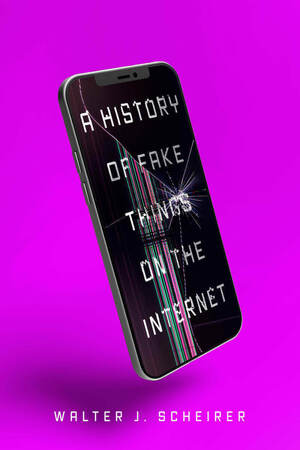Disinformation expert explores history and future of fake news in new book

The era of fake news feels brand-new.
But a new book, “A History of Fake Things on the Internet,” takes a deeper look into the origins of online deception.
“There’s this conventional narrative about fake news and manipulated imagery on the internet. But when I started to actually research this and looking into the history, it was very apparent to me that these are very long-standing issues,” said author Walter Scheirer, the Dennis O. Doughty Collegiate Associate Professor of Computer Science and Engineering at the University of Notre Dame.
The book takes readers on a journey that begins long before the internet existed, focusing on photo manipulation before diving into digital fakery of the ’80s and ’90s through today. Scheirer recognizes that the big fear people often have is that the perfect fake image or video could be created to fool the world into believing something wrong — he believes that’s unlikely.
“What I have found, which is more interesting and more concerning, is that obviously fake content is getting way more traction on the internet,” Scheirer said. “Things like memes often have a message that’s funny, right? But the message can still be dangerous.”
As an expert in image forensics, machine learning and AI, Scheirer conducts research at Notre Dame that focuses on combatting the rise of coordinated social media campaigns to incite violence, sow discord and threaten the integrity of democratic elections.
Often, these campaigns feature manipulated images exhibiting false claims and misrepresentation of incidents, fabricated news stories and memes, all created with the intent to provoke citizens and supporters of both political parties. The goal of his research with Tim Weninger, the Frank M. Freimann Associate Professor of Engineering, is to develop an early warning system that identifies manipulated images, deepfake videos and disinformation online.
“On the one hand, you have an enormous amount of fake material on the internet. Some of it appears to be threateningly bad. But it doesn’t seem like that’s stopping people from consuming it. In fact, people seem to be generating more and more of it,” Scheirer said.
But Scheirer’s book brings a different, more optimistic approach by questioning the surface level reading of the internet. He points to this idea that the whole world is creating fiction online and telling stories in their own distinct communities. It’s when that fiction reaches community outsiders that misunderstandings can occur.
In the future, he believes generative AI content is going to be the next frontier for leveling up creativity of the internet.
“It turns out the internet’s a really great creative engine. It’s the ultimate medium for storytelling,” Scheirer said. “I love the internet. And I think others can too if they learn to appreciate it as a really innovative, interesting place.”
“A History of Fake Things on the Internet” will be released by Stanford University Press on Dec. 5.
Contact: Brandi Wampler, associate director of media relations, 574-631-2632, brandiwampler@nd.edu
Originally published by at news.nd.edu on November 17, 2023.
Latest Research
- Fighting for maternal healthThe United States has the highest maternal mortality rate of developed nations. An innovative postpartum care model from Notre Dame can save mothers around the globe. Read the story Originally…
- NSF Cyber SMART’s fall meeting shapes fifth year of project, legacy and future plans, and adds new memberThe U.S. National Science Foundation (NSF) Cyber SMART center gathered for its fall meeting on the University of Notre Dame campus this September. The meeting served as a checkpoint with progress reports and new projects from research leads and students…
- Slavic and Eurasian studies professor wins Humboldt fellowship to research how Russia’s religious past shapes its presentWhen Russia invaded Ukraine on Feb. 24, 2022, Sean Griffin realized his second book needed a new title. Griffin, an associate professor in the University of Notre Dame’s Department of…
- Notre Dame’s R.I.S.E. AI Conference builds interdisciplinary collaboration to inform human-centered artificial intelligenceAs artificial intelligence (AI) transforms nearly every sector of society — from healthcare and education to governance and global development — a critical question emerges: How can we conscientiously design and deploy these powerful technologies to positively impact society? This…
- University of Notre Dame joins the Global Coalition of Ukrainian StudiesThe University of Notre Dame has joined the Global Coalition of Ukrainian Studies after signing a Memorandum of Cooperation (MOC), formalized on September 24, 2025, at the Ukrainian Institute of America in New York City. Notre Dame joined four other American…
- The University of Notre Dame’s Mendoza College of Business and Industry Labs team up to inspire national security manufacturing competitiveness in the regionThe South Bend - Elkhart Region is full of manufacturing companies that are poised to grow, and Executive Master of Business Administration (EMBA) and Master of Business Administration (MBA) students at the University of Notre Dame are finding innovative ways to contribute to that growth. Earlier…













